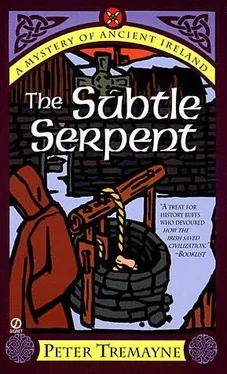Peter Tremayne - The Subtle Serpent
Здесь есть возможность читать онлайн «Peter Tremayne - The Subtle Serpent» весь текст электронной книги совершенно бесплатно (целиком полную версию без сокращений). В некоторых случаях можно слушать аудио, скачать через торрент в формате fb2 и присутствует краткое содержание. Жанр: Исторический детектив, на английском языке. Описание произведения, (предисловие) а так же отзывы посетителей доступны на портале библиотеки ЛибКат.
- Название:The Subtle Serpent
- Автор:
- Жанр:
- Год:неизвестен
- ISBN:нет данных
- Рейтинг книги:3 / 5. Голосов: 1
-
Избранное:Добавить в избранное
- Отзывы:
-
Ваша оценка:
- 60
- 1
- 2
- 3
- 4
- 5
The Subtle Serpent: краткое содержание, описание и аннотация
Предлагаем к чтению аннотацию, описание, краткое содержание или предисловие (зависит от того, что написал сам автор книги «The Subtle Serpent»). Если вы не нашли необходимую информацию о книге — напишите в комментариях, мы постараемся отыскать её.
The Subtle Serpent — читать онлайн бесплатно полную книгу (весь текст) целиком
Ниже представлен текст книги, разбитый по страницам. Система сохранения места последней прочитанной страницы, позволяет с удобством читать онлайн бесплатно книгу «The Subtle Serpent», без необходимости каждый раз заново искать на чём Вы остановились. Поставьте закладку, и сможете в любой момент перейти на страницу, на которой закончили чтение.
Интервал:
Закладка:
‘Is there a need to stand up for the rights of women? Surely the laws of the five kingdoms are precise enough for the protection of women? Women are protected from rape, from sexual harassment and even from verbal assault. And they are equal under the law.’
‘Sometimes that is not enough,’ replied the girl seriously. ‘Abbess Draigen sees the weaknesses in our society and campaigns for greater rights.’
‘That I do not understand. Perhaps you might be goodenough to explain it. You see, if the abbess wants increased rights for women, why does she argue that the Laws of the Fenechas should be rejected and that we should accept the new ecclesiastical laws? Why does she stand in favour of the Penitentials which originate in their philosophies from Roman law? These laws place women in a subservient role.’
Sister Lerben was eager to explain.
‘The canon laws, which Draigen wishes to support, would make it a more serious offence to kill a woman than a man. A life for a life. At the moment all the laws of the five kingdoms say is that compensation must be paid and the killer must be rehabilitated. The laws which the Roman church suggest is that the attacker should pay with his life and be made to suffer physical pain. The abbess has shown me some of the Penitentials which say that if a man kills a woman then his hand and foot should be cut off and he is made to suffer pain before being put to death.’
Fidelma stared in distaste at the bloodthirsty eagerness of the young girl.
‘And a woman can be burned to death for the same offence,’ Fidelma pointed out. ‘Isn’t it better to seek compensation for the victim than exact vengeance on the perpetrator? Isn’t it better to attempt to rehabilitate the wrong doer and help the victim than exact painful revenge that gains nothing but a brief moment of satisfaction?’
Sister Lerben shook her head. Her tone was vehement.
‘Draigen says that it is written in the scripture: “life for life, eye for eye, tooth for tooth, hand for hand, foot for foot …”’
‘The words of Exodus are often quoted,’ interrupted Fidelma tiredly. ‘Surely it would be better looking at the words of the Christ who gave a new dispensation. Look at the Gospel of the Blessed Matthew and you will find these words of the Christ: “Ye have heard that it hath been said, an eye for an eye, and a tooth for a tooth: But I say unto you, That ye resist not evil; but, whosoever shall smite thee on thy rightcheek, turn to him the other also.” That is the word of the God we follow.’
‘But Abbess Draigen said …’
Fidelma held up her hand to quiet the girl.
‘No set of laws are perfect but there is little use rejecting good laws for bad ones. Here women have rights and protections. There is equality before the law. The foreign laws that are creeping into this land by way of the Penitentials mean that only the wealthy and people of rank can afford the law.’
‘But Abbess Draigen …’
‘Is not an expert on law,’ interrupted Fidelma firmly. She really did not want to get waylaid into a debate on the merits of rival law systems, especially with a young girl who really did not know more than she had been told by a biased authority. She knew clearly where Draigen stood in support of the new Penitentials which, in Fidelma’s estimation, were threatening to undermine the laws of the five kingdoms.
Sister Lerben lapsed into a sullen silence.
‘I know that you admire the abbess,’ Fidelma began again. ‘That is a right and proper attitude to adopt towards one’s mother.’
‘So you know that?’ Sister Lerben’s chin came up defensively.
‘Surely an abbey is not a place wherein to keep a secret?’ Fidelma asked mildly. ‘Besides, there is no law in either the church of Ireland or Rome that forbids love and marriage between men and women of the religious.’ She could not help adding, ‘But those who support the new ecclesiastical rules would deny that love.’
Fidelma knew that in Europe, during the last two centuries, there had been a small but vociferous group who had expressed doubts on the compatibility of marriage and the religious life. Jerome and Ambrose had led those who thought that celibacy was a higher spiritual condition than marriage and Jerome’s friend Pope Damascus had been thefirst to express a favourable attitude towards the idea. So far, even in Rome, however, those favouring celibacy were still only a small but nonetheless influential group. Those who believed that celibacy should be mandatory and were therefore affecting the writing of Penitentials. Though, so far, they had not the backing of Rome’s ecclesiastical laws.
Sister Lerben sat without expression.
‘How long have you been in this community, Lerben? I presume that it has been since your birth?’
‘No. When I was seven I was sent for fosterage.’
It was an ancient custom in the five kingdoms among those of wealth to send their children away at the age of seven to be fostered or educated, with a teacher. For boys the fosterage ended at the age of seventeen, for girls the fosterage ended at the age of fourteen.
‘And you returned here when you were fourteen?’ asked Fidelma.
‘Three years ago,’ agreed the girl.
‘You had no thought of going elsewhere than to your mother’s abbey?’
‘No, why should I? Since I had been away many things had changed here. My mother had excluded all men.’
‘Do you dislike men so much?’ asked Fidelma in surprise.
‘Yes!’ The word was immediate and vehement.
‘Why so?’
‘Men are dirty, disgusting animals.’
Fidelma heard the intensity in her voice and wondered what experience had prejudiced the girl.
‘Without them the human race would die out,’ she pointed out softly. ‘Your father was a man.’
‘Then let it die out!’ returned the girl uncompromisingly. ‘My father was a pig.’
The hatred on the girl’s features was something which amazed even Fidelma.
‘I presume that you speak of Febal?’
‘I do.’
An idea began to form in Fidelma’s mind.
‘So it was your father who has coloured your attitude to men?’
‘My father … a red hot stone in his throat! May he die choking!’
The curses were venomous.
‘What did your father do to you to make you hate him so?’
‘It is what he did to my mother. I do not wish to talk about my father.’
Sister Lerben’s face was white and Fidelma noticed that a shiver passed through her slender frame as if of distaste. Fidelma began to realise that there was some deep conflict in the girl.
‘So have you found solace here?’ she passed on hurriedly. ‘And have you found friendship with any of the other sisters?’
The girl shrugged indifferently.
‘Some of them.’
‘Not Sister Berrach, though?’
Lerben shuddered.
‘That cripple! She should have died at birth.’
‘And Sister Brónach?’
‘A stupid old woman. She is always hanging round that feeble Berrach! She has had her time.’
‘Then what of Sister Síomha, the steward? Were you friendly with her?’
Sister Lerben made an ugly face.
‘She fancied herself, that one. She was dirty and disgusting!’
‘Why? Why dirty and disgusting, Lerben?’ demanded Fidelma, watching the young woman’s flushed face.
‘She liked men. She had a lover.’
‘A lover. Do you know whom?’
‘I think it is obvious. These last few weeks, on those nights she has not been attending the watch at the clepsydra, I have seen her returning before dawn from Adnár’s fort. Síomhawould not descend to liaisons with common warriors or servants. So you do not have to hunt far to know with whom she has defiled herself.’
‘Do you mean your uncle? Adnár?’
Читать дальшеИнтервал:
Закладка:
Похожие книги на «The Subtle Serpent»
Представляем Вашему вниманию похожие книги на «The Subtle Serpent» списком для выбора. Мы отобрали схожую по названию и смыслу литературу в надежде предоставить читателям больше вариантов отыскать новые, интересные, ещё непрочитанные произведения.
Обсуждение, отзывы о книге «The Subtle Serpent» и просто собственные мнения читателей. Оставьте ваши комментарии, напишите, что Вы думаете о произведении, его смысле или главных героях. Укажите что конкретно понравилось, а что нет, и почему Вы так считаете.











